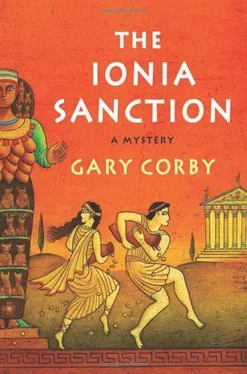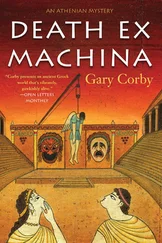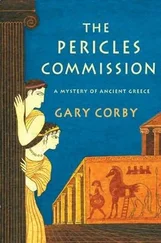Gary Corby - The Ionia Sanction
Здесь есть возможность читать онлайн «Gary Corby - The Ionia Sanction» весь текст электронной книги совершенно бесплатно (целиком полную версию без сокращений). В некоторых случаях можно слушать аудио, скачать через торрент в формате fb2 и присутствует краткое содержание. Год выпуска: 2011, ISBN: 2011, Издательство: Macmillan, Жанр: Исторический детектив, на английском языке. Описание произведения, (предисловие) а так же отзывы посетителей доступны на портале библиотеки ЛибКат.
- Название:The Ionia Sanction
- Автор:
- Издательство:Macmillan
- Жанр:
- Год:2011
- ISBN:9780312599010
- Рейтинг книги:4 / 5. Голосов: 1
-
Избранное:Добавить в избранное
- Отзывы:
-
Ваша оценка:
- 80
- 1
- 2
- 3
- 4
- 5
The Ionia Sanction: краткое содержание, описание и аннотация
Предлагаем к чтению аннотацию, описание, краткое содержание или предисловие (зависит от того, что написал сам автор книги «The Ionia Sanction»). Если вы не нашли необходимую информацию о книге — напишите в комментариях, мы постараемся отыскать её.
The Ionia Sanction — читать онлайн бесплатно полную книгу (весь текст) целиком
Ниже представлен текст книги, разбитый по страницам. Система сохранения места последней прочитанной страницы, позволяет с удобством читать онлайн бесплатно книгу «The Ionia Sanction», без необходимости каждый раз заново искать на чём Вы остановились. Поставьте закладку, и сможете в любой момент перейти на страницу, на которой закончили чтение.
Интервал:
Закладка:
“Thank you, master .”
She looked at me blankly.
“I am your master. You will address me correctly.”
I thought for a moment she would argue, but she seemed to get control of herself and said, “Yes, master. ” She didn’t quite spit it out.
“Master, are you really an agent?”
“Yes, of course.”
“In that case, master, I want to hire you.”
I laughed. “Asia, I think we might have this master-slave relationship thing around the wrong way.”
“No, I mean it, master. I need you to return me to my father.”
“Your father’s the one who sold you.”
“My father loves me. He’d never sell me.”
Sure he wouldn’t. That’s why I’d found the girl in a slave market. “All right then, I’ll humor you for a moment. Who is your father?”
She drew herself up to her full height, which wasn’t much, and announced, “I swear destruction for the man who enslaved me. As my father did to his enemies, so I follow his example. I am Asia, daughter of Themistocles. My father is Satrap of Magnesia in the name of the Great King, and I am hiring you to take me home.” She paused, then said anxiously, “I’m afraid you’ll have to take payment on delivery.”
5
A man of substance dear to his fellows; for his dwelling was by the road-side and he entertained all men.
Was she telling the truth? I didn’t have time to quiz Asia on the spot, I barely had time to deposit her at home before preparing for the symposium. I ushered her in through the front door, having warned her to tell no one her father’s name.
“Where did you get her?” It was Socrates. He’d wandered into the entrance hall, and looked Asia up and down appreciatively. It occurred to me my little brother was growing up.
“She’s a slave. I bought her. Today.”
“ You bought her?”
“Yes.”
Socrates inspected my purchase once more, and said, “I wouldn’t want to be in your place when Diotima sees her!”
“Who’s Diotima?” Asia asked.
“His girlfriend,” Socrates said to Asia.
“No, she’s not,” I said. “Diotima will never see her, and anyway I don’t care if she does.”
“That’s bad logic,” Socrates said. “Either you don’t care if Diotima sees her, or else you do care but you’re not worried they’ll meet. They can’t both be true; it’s an exclusion principle, you see-”
“Socrates, I need you to do something for me,” I said, cutting him off before he could go on about his principle, whatever it was. “I have to get ready for the symposium. Get Asia some food and a proper tunic, will you? The tunic the slave dealer threw in is so moth-eaten it’s ready to fall apart. She needs something tough enough for travel.” I paused. “Sandals too.” Sandals were a major extravagance for a slave, but I reasoned we had some hard traveling to do.
“Can I take the slave girl to the agora?”
“I have a name, it’s Asia.” She glared at Socrates.
Socrates would be there to watch her, but Socrates … hmm.
I said, “Run along and play, children.”
Asia ran into the street at once. I grabbed Socrates’ arm as he followed her, looked into his eyes, and said firmly, “She was a virgin when I bought her. She better still be a virgin when you bring her back. Got it?”
Socrates grinned. “Yes Nico.”
I washed at the gymnasium and had a barber cut my hair and shave me. One doesn’t call upon the mighty without looking one’s best, especially if one is as low as one can get and still be a citizen.
My mother’s slaves laundered my best chiton. It was a rush job, so the smell of the laundry still hung about the cloth-they use urine to bleach, and it lingers-but they sprinkled me with scented water that almost erased the smell. The chiton was tied about my waist with clean ceremonial rope, into which strands of blue ribbon had been threaded. The only sandals I owned were old, scuffed, and had been soaked in blood on more than one occasion. I sent a male slave to the agora with my old sandals for comparison, and orders to buy a decent pair of formal wear. The ones he returned with were pretty, made of highly polished light leather with silver buckles, and minutely embossed with a Dionysiac scene. They would fall apart after a day’s hard walking, and cost five times what my sturdy pair had done. I sighed and reflected that the slave had done exactly what I’d ordered. Next time I would think before I sent a slave to market with general instructions.
Callias rose as I was shown into his courtyard. He was graying, well dressed, and manicured, showing none of the paunch an older man might acquire. Callias made his money mostly from renting slaves to the silver mines run by the state. That was his private business, but he was also a man who took part in public affairs. He was probably Athens’ most experienced diplomat, and certainly the smoothest.
He gave me a broad smile and said, “Nicolaos, so good to see you. Pericles told me you were coming. I’m glad.”
The home of Callias is remarkable for its size, and its beautiful courtyards and garden.
“I could work for a hundred years and never afford the equal of this,” I said, looking around in appreciation.
“You are too kind.”
“Merely realistic.” I paused for a moment, not sure how to broach the subject. “Callias, did Pericles tell you why he asked me here?”
“Pericles has told me everything. It was I who suggested he invite you. Now hush, don’t mention it until after dinner. I think you will enjoy your fellow guests. Among them will be Anaxagoras, the philosopher. You may know he’s a friend of Pericles. The others are my son Hipponax and his friend Telemides. Hipponax is a good lad and in high spirits. He’s recently married.”
At that moment Pericles and Anaxagoras were announced and walked into the courtyard side by side. Pericles nodded his head to Callias, turned an ice-cold smile on me, and uttered a few simple words; Anaxagoras greeted his host by taking Callias’ hands and quoting Homer, “‘A man of substance dear to his fellows; for his dwelling was by the road-side and he entertained all men.’ Thank you, dear Callias, for this invitation. Would that Homer were alive today so that he could describe you in such language.”
Hipponax and Telemides arrived before Anaxagoras could continue with more flowery words, and we all settled onto our couches. It was a warm night so they’d been moved into the courtyard and torches lit. Slaves brought out scented garlands, which we placed around our heads, and cups of aromatic wine. A flute girl emerged from the colonnades and played something soft and lilting.
Slaves brought in the first of the dishes: plates of fish, eels, octopus, vegetables, and two hares. We ate with little conversation, as is the custom. Revelry waits upon the removal of the dishes.
As we ate, I looked sideways with interest at Anaxagoras. He was a famous man, not for his wealth, politics, or military prowess, but because Athens had never seen his like before: a professional philosopher, a man who earned his living by telling other men what he thought of things, as if his views were better than anyone else’s. Everyone knew Pericles funded Anaxagoras. The philosopher had arrived in Athens five years ago and attached himself to the young politician long before he had risen to the top. Was it luck, or had Anaxagoras seen something in Pericles right from the start?
The philosopher wore a rather bushy beard but was half bald. What hair he had on top and his beard were a light brown, almost blond. His eyes were a dark blue, his manner lively, and his paunch particularly visible as he lay upon his dining couch. I guessed him to be about forty years old, or perhaps a little older. That made him five to ten years older than Pericles.
Читать дальшеИнтервал:
Закладка:
Похожие книги на «The Ionia Sanction»
Представляем Вашему вниманию похожие книги на «The Ionia Sanction» списком для выбора. Мы отобрали схожую по названию и смыслу литературу в надежде предоставить читателям больше вариантов отыскать новые, интересные, ещё непрочитанные произведения.
Обсуждение, отзывы о книге «The Ionia Sanction» и просто собственные мнения читателей. Оставьте ваши комментарии, напишите, что Вы думаете о произведении, его смысле или главных героях. Укажите что конкретно понравилось, а что нет, и почему Вы так считаете.












